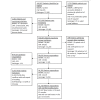OpenNotes After 7 Years: Patient Experiences With Ongoing Access to Their Clinicians' Outpatient Visit Notes
- PMID: 31066717
- PMCID: PMC6526690
- DOI: 10.2196/13876
OpenNotes After 7 Years: Patient Experiences With Ongoing Access to Their Clinicians' Outpatient Visit Notes
Erratum in
-
Correction: OpenNotes After 7 Years: Patient Experiences With Ongoing Access to Their Clinicians' Outpatient Visit Notes.J Med Internet Res. 2020 Apr 30;22(4):e18639. doi: 10.2196/18639. J Med Internet Res. 2020. PMID: 32352924 Free PMC article.
Abstract
Background: Following a 2010-2011 pilot intervention in which a limited sample of primary care doctors offered their patients secure Web-based portal access to their office visit notes, the participating sites expanded OpenNotes to nearly all clinicians in primary care, medical, and surgical specialty practices.
Objective: The aim of this study was to examine the ongoing experiences and perceptions of patients who read ambulatory visit notes written by a broad range of doctors, nurses, and other clinicians.
Methods: A total of 3 large US health systems in Boston, Seattle, and rural Pennsylvania conducted a Web-based survey of adult patients who used portal accounts and had at least 1 visit note available in a recent 12-month period. The main outcome measures included patient-reported behaviors and their perceptions concerning benefits versus risks.
Results: Among 136,815 patients who received invitations, 21.68% (29,656/136,815) responded. Of the 28,782 patient respondents, 62.82% (18,081/28,782) were female, 72.90% (20,982/28,782) were aged 45 years or older, 76.94% (22,146/28,782) were white, and 14.30% (4115/28,782) reported fair or poor health. Among the 22,947 who reported reading 1 or more notes, 3 out of 4 reported reading them for 1 year or longer, half reported reading at least 4 notes, and 37.74% (8588/22,753) shared a note with someone else. Patients rated note reading as very important for helping take care of their health (16,354/22,520, 72.62%), feeling in control of their care (15,726/22,515, 69.85%), and remembering the plan of care (14,821/22,516, 65.82%). Few were very confused (737/22,304, 3.3%) or more worried (1078/22,303, 4.83%) after reading notes. About a third reported being encouraged by their clinicians to read notes and a third told their clinicians they had read them. Less educated, nonwhite, older, and Hispanic patients, and individuals who usually did not speak English at home, were those most likely to report major benefits from note reading. Nearly all respondents (22,593/22,947, 98.46%) thought Web-based access to visit notes a good idea, and 62.38% (13,427/21,525) rated this practice as very important for choosing a future provider.
Conclusions: In this first large-scale survey of patient experiences with a broad range of clinicians working in practices in which shared notes are well established, patients find note reading very important for their health management and share their notes frequently with others. Patients are rarely troubled by what they read, and those traditionally underserved in the United States report particular benefit. However, fewer than half of clinicians and patients actively address their shared notes during visits. As the practice continues to spread rapidly in the United States and internationally, our findings indicate that OpenNotes brings benefits to patients that largely outweigh the risks.
Keywords: electronic health record; health care survey; patient participation; patient portal; physician-patient relations.
©Jan Walker, Suzanne Leveille, Sigall Bell, Hannah Chimowitz, Zhiyong Dong, Joann G Elmore, Leonor Fernandez, Alan Fossa, Macda Gerard, Patricia Fitzgerald, Kendall Harcourt, Sara Jackson, Thomas H Payne, Jocelyn Perez, Hannah Shucard, Rebecca Stametz, Catherine DesRoches, Tom Delbanco. Originally published in the Journal of Medical Internet Research (http://www.jmir.org), 06.05.2019.
Conflict of interest statement
Conflicts of Interest: All authors had financial support for the submitted work from the Robert Wood Johnson Foundation, Gordon and Betty Moore Foundation, Peterson Center on Healthcare, and Cambia Health Foundation. The funders had no role in designing or conducting the study, analyzing the data, preparing the manuscript, or deciding to submit this manuscript for publication.
Figures
References
-
- Delbanco T, Walker J, Bell SK, Darer JD, Elmore JG, Farag N, Feldman HJ, Mejilla R, Ngo L, Ralston JD, Ross SE, Trivedi N, Vodicka E, Leveille SG. Inviting patients to read their doctors' notes: a quasi-experimental study and a look ahead. Ann Intern Med. 2012 Oct 2;157(7):461–70. doi: 10.7326/0003-4819-157-7-201210020-00002. http://europepmc.org/abstract/MED/23027317 1363511 - DOI - PMC - PubMed
Publication types
MeSH terms
LinkOut - more resources
Full Text Sources
Research Materials



